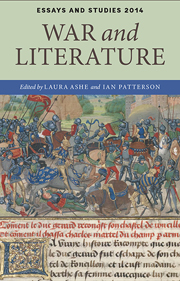Book contents
- Frontmatter
- Contents
- List of Illustrations
- Notes on Contributors
- Preface
- I IDEOLOGIES
- II INTERPRETATIONS
- Crossing the Rubicon: History, Authority and Civil War in Twelfth-Century England
- ‘The Reader myghte lamente’: The sieges of Calais (1346) and Rouen (1418) in chronicle, poem and play
- Shakespeare's Casus Belly; or, Cormorant War, and the Wasting of Men on Shakespeare's Stage; or, Eating Wars and Digesting Plays; or, The Art of Chucking Men Into Pits; or, Shakespeare, Tacitism, and Why Plato Don't Matter
- Unnavigable Kinship in a Time of Conflict: Loyalist Calligraphies, Sovereign Power and the ‘Muckle Honor’ of Elizabeth Murray Inman
- Proclaiming the War News: Richard Caton Woodville and Herman Melville
- III AFTERMATHS
- Index
‘The Reader myghte lamente’: The sieges of Calais (1346) and Rouen (1418) in chronicle, poem and play
from II - INTERPRETATIONS
Published online by Cambridge University Press: 05 October 2014
- Frontmatter
- Contents
- List of Illustrations
- Notes on Contributors
- Preface
- I IDEOLOGIES
- II INTERPRETATIONS
- Crossing the Rubicon: History, Authority and Civil War in Twelfth-Century England
- ‘The Reader myghte lamente’: The sieges of Calais (1346) and Rouen (1418) in chronicle, poem and play
- Shakespeare's Casus Belly; or, Cormorant War, and the Wasting of Men on Shakespeare's Stage; or, Eating Wars and Digesting Plays; or, The Art of Chucking Men Into Pits; or, Shakespeare, Tacitism, and Why Plato Don't Matter
- Unnavigable Kinship in a Time of Conflict: Loyalist Calligraphies, Sovereign Power and the ‘Muckle Honor’ of Elizabeth Murray Inman
- Proclaiming the War News: Richard Caton Woodville and Herman Melville
- III AFTERMATHS
- Index
Summary
The fields were not sown or ploughed. There were no cattle or fowl in the fields. No cock crowed in the depth of night to tell the hours. No hen called to her chicks. It was of no use for the kite to lie in wait for chickens in March of this year nor for children to hunt for eggs in secret hiding places. No lambs or calves bleated after their mothers in this region. The wolf might seek its prey elsewhere and here fill his capacious gullet with green grass instead of rams. Larks soared safely through the air and lifted their unending songs with no thought of the whistling attacks of eyas or falcon. No wayfarers went along the roads, carrying their best cheese and dairy produce to market. Throughout the parishes and villages, alas! went forth no mendicants to hear confessions and to preach in Lent but rather robbers and thieves to carry off openly whatever they could find. Houses and churches no longer presented a smiling appearance with newly repaired roofs but rather the lamentable spectacle of scattered, smoking ruins to which they had been reduced by devouring flames. The eye of man was no longer rejoiced by the accustomed sight of green pastures and fields, charmingly colored by the growing grain, but rather saddened by the looks of the nettles and thistles springing up on every side.
- Type
- Chapter
- Information
- War and Literature , pp. 84 - 106Publisher: Boydell & BrewerPrint publication year: 2014



